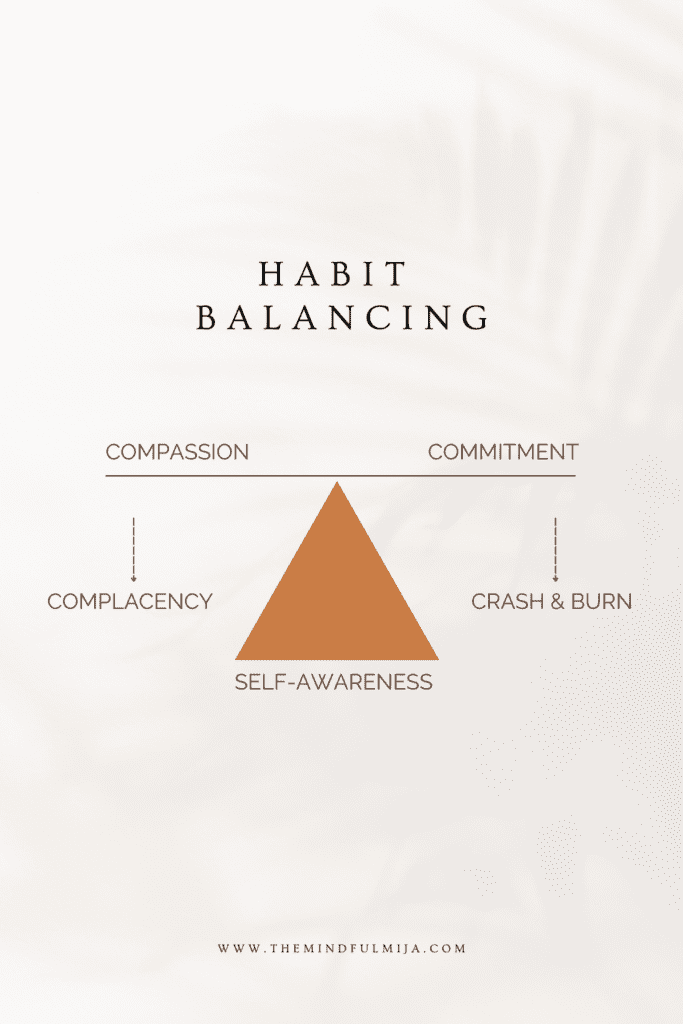As women who are probably both overachievers & overcommitters, it is imperative to know when we need to stay consistent versus when we need to be okay with taking a break.
We’re inundated with bro marketing the glorifies waking up at 4AM, grinding on our side hustles, hitting the gym til we can’t walk, constantly hustling in your 9-5, etc.
Don’t get me wrong, I love discipline. I wrote an entire blog post on habits! Habit trackers & streaks motivate the crap out of me! I love tackling to-do lists!
AND…
Wisdom & sustainability are rarely (if ever…) found in the extremes.
The truth is, I don’t think we give ourselves enough credit. Oftentimes, we know what we need—but we listen to the shoulds & what ifs instead. If this is you, you’re in the right place!
In this blog post you’ll learn how to balance commitment to our goals & compassion for ourselves, & we’ll also increase your self-awareness by getting honest with three deep questions…
Ready? Let’s dive in, amiguis!
The Neuroscience Behind Stress–Is It All Bad?
Think of any movie montage where a character is going through a major life change, & on the flip side think of the modern day dream of retiring early.
We live in a world that idolizes making mountain-moving changes OR laying on a beach & not having a care in the world.
It begs the question: Do we have to live on either end of the spectrum? 👀
Of course not! That’s not reality. Doing the most is not sustainable, but constant rest leaves us feeling meaningless eventually.
As humans, we find fulfillment in working toward a goal. We want to be pushed, to feel like we’re growing, to know we are living in our purpose.
Though we’ve learned that stress is the root of all evil, this doesn’t take account for eustress: the positive stress that comes from going after our desires.
Push Through or Push Pause: An Explanation

Compassion:
You are not a machine, you are a human. It’s why we’re called human beings, not human doings.
You are part of nature. Like the tides of the ocean rise & fall, like the seasons fade from summer to winter, you need this ebb & flow between purposeful work & intuitive rest.
There is a balance between being motivated to get things done & knowing when to listen to what you need. Through having deep self-awareness, you’re able to have self-compassion.
You can be honest with yourself when you’re reaching the point where you need a break, but you can also hold yourself accountable to know when you’re going a little toooo easy on yourself.
Let’s say you’re starting to feel sick, but you’re supposed to go to the gym to do leg day. You told yourself you’d go to the gym four times this week & skipping this session would mean you wouldn’t hit your goal.
BUT you have a big presentation in a few days & if you push yourself too hard, you’ll probably have to call out sick.
You decide to stay home & spend that hour making yourself a nourishing soup.
You could beat yourself up because you didn’t make it to the gym…OR you could celebrate yourself for recognizing that what you actually needed was to rest up, enjoy some sopita, & head to bed early.
Mija, you’re allowed to have self-compassion & listen to what you need without it meaning anything about you (other than the fact that you’re very attuned to yourself!).
Complacency:
If you take self-compassion to the extreme, you’re passed the point of compassion & have entered the land of complacency. This is when you’re unhealthily content with where you’re at & you have no motivation to get yourself to a different place.
Let’s say that you took it easy & recovered from your cold in no time, then once you’re feeling better you just didn’t feel like going to the gym. You don’t go.
Then, the next day your workday is busier than normal. You don’t go again.
The next day, you already had plans with your cousins. You skip again.
Pretty soon, you look at the calendar & two months have passed.
What started out as necessary self-compassion actually turned into just getting complacent.
In the book Atomic Habits, James Clear talks about how if you skip a day, it’s no big deal. It happens to us all! But if you miss two days in a row, suddenly you have a new habit of not keeping your original habit.
This is not only harmful because it keeps you stuck, but it also changes how you see yourself. Rather than being the person who doesn’t know how to take breaks, you’ve become the person who doesn’t want to put in work at all…
You start to lose confidence in your ability because you’re no longer showing yourself that you can do hard things, & this spills over into every area of your life.
When your boss asks you to take on a new project at work, you’re scared you won’t be able to handle the workload.
When your bestie asks if you want to do a half marathon that summer, you’re not sure you could stick to the training.
You’ve started to question whether or not you can trust yourself to do what you say you will.
We crave a good sweat, working toward our purpose, testing the limits of our comfort zones! That is why we need the ebb AND flow between compassion & commitment—if it’s all ebb, you move passed compassion & into complacency.


Commitment:
Ahhh, commitment. This “C” could also be interchanged with the word consistency.
This is probably something we’re all familiar with: the grind, the habit trackers, the no-days-off mentality.
& tbh, while this sometimes gets a bad rap, it’s not all bad.
Commitment builds confidence, because we prove that we can trust ourselves with hard things.
When we come home exhausted & all we want to do is lay on the couch with our favorite bingeable Netflix show, we choose to put on the workout clothes that we laid out this morning & head to a workout class.
When we spent hours meal prepping but Uber Eats sounds reeeeally nice, we leave our phone in the other room & take the Tupperware out of the fridge.
There is something beautiful about setting an intention & then making strides toward it!
I once heard Jay Shetty talking about how him & his wife, Radhi, take really good care of their bodies. He said something around these lines that stuck with me: “If I get cancer one day, so be it. But I don’t want it to be because of the things I chose to do.”
While we can’t control everything that happens in life, there is a great deal that we can control.
Someone could get sick tomorrow.
But if they have money set aside to cover their insurance deductible, they’ve been going to the gym so they were fairly healthy to begin with, they’ve invested a lot into your relationship & their partner is happy help take care of them…
Their recovery process would be much smoother than if none of those things were in place.
Commitments ensures that we are better equipped to handle whatever life throws our way!
Crash (& Burn!):
But just like the extreme version of compassion isn’t positive, the opposite of commitment isn’t either. Extreme commitment leads to crashing & burning.
It can cause a sense of overwhelm, leading to crippling anxiety that hinders your ability to decipher when you need to push pause.
It can cause you to become resentful of whatever it is that used to bring you joy, because you’re sacrificing your own well-being to invest in a goal.
Eventually, this overwhelm & resentment can lead to burnout, pushing you to not even want to pursue that goal in the first place.
Please, don’t do this to yourself.
You’ve worked too hard to put yourself in a position that compromises your desires. If you get to this point, everything you’ve already done is deemed irrelevant anyway.
In order to prevent this from happening in the first place, see-saw between compassion & commitment–but steer clear of either extreme.

(re)Consider:
Okay, as somebody who has changed her mind a lot & used to feel shame for it, I couldn’t talk about this stuff without talking about the difference between complacency & (re)considering.
(& I also wanted everything to start with a “C,” hence why it’s (re)consider lol!)
Reconsidering does not mean that you’re lazy, incapable, or giving up—it just means that you’ve pivoted to a different goal altogether.
In the original example of feeling sick, let’s say that you ended up skipping the gym but you still wanted to get some form of movement in (simply because it’s therapeutic for you).
You found a gentle yoga video on YouTube & it made you feel so amazing. In fact, you loved it so much that you decided to stop lifting to have more time to practice yoga.
This would not make you a failure because you are no longer meeting your goal of going to the gym four times a week. The goal is still related, it’s just changed!
There are two ways to know whether you’re getting a bit lazy or if you’re just pivoting directions:
- Changing directions is normally intentional, so you’re aware that it’s happening (even if you’re feeling a bit guilty about it). Complacency normally sneaks up on you & is unintentional.
- It also almost always entails a new goal. You’re not just not doing the original goal; you actually switched to a whole new goal completely. You are intentionally putting energy toward something else.
Have the motivation to be committed, have the self-awareness to have compassion, & have the understanding to know when you need to pivot.
Questions to Get Honest With Yourself…
Speaking of questions, there are a few things you can ask yourself to get really honest. This is how you can see whether you’re being overly compassionate or overly rigid, aka whether you need to push through or push pause.
I’d encourage you to write these in your phone’s notes app & then pin them so you can refer to them later!

Am I proud of the effort I’m putting in?
Have you ever played a game & lost, but you knew you didn’t put your best foot forward? You were probably left with a sense of what if that stung even worse than the loss itself.
Have you ever played a game & won, but you weren’t actually trying that hard? The victory probably wasn’t as sweet as it could have been.
You don’t always control the results, & you don’t always control when they come. It normally takes time to start seeing outcomes, so if you’re waiting to feel proud of yourself…well, just stop lol.
Instead, be proud of yourself for the effort you’re putting in. If you’re doing your best (whatever that looks like), you are worthy of celebration!
You can’t always control the outcome, but you most definitely can control the effort you put in—& only YOU can determine if you actually did your best.
Be honest with yourself & make yourself proud, mija!
Do I still make time for what’s important to me outside of this activity?
This is a good way to gauge whether you’re starting to move through commitment & reach the border for crash.
Are you still spending intentional time with your partner? Going to the gym? Taking your dog to the park? Having quiet time when you wake up?
There is such a thing as too much of a good thing.
If what you’re doing is good for you, but you’re doing it so much that it’s actually taking energy from other priorities in your life, it might be time to refocus before you crash.
There might be seasons right before a deadline at work or while your partner needs extra loving or when you’re trying to reach a fitness goal before a big race—that’s not what I’m talking about.
Again: be honest with yourself.
Is this really just a season, or is it becoming a lifestyle?
Only you can answer that question for yourself.
What do I need in this moment? How would I feel pushing through or pushing pause—what would future me be most thankful for?
When you’re really in a pickle, think about what future you would be thankful for.
Sometimes the answer will be that you really need to suck it up & get things done, but other times it might be that you really actually would benefit more from a nap.
When you take the time to ask yourself what you need, you get to connect with yourself & realign your actions with your goals.
Through growing our self-awareness, we are able to exhibit compassion & accountability for ourselves. We are able to fluidly move between compassion & commitment, ensuring that we are doing what will make us proud without burning us out.

2 Responses